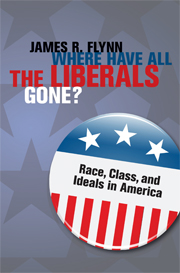Book contents
- Frontmatter
- Contents
- List of figures and maps
- List of tables
- List of boxes
- Acknowledgments
- Prologue
- Part I St. Thomas Jefferson
- Part II Blacks and the pursuit of happiness
- Part III Yours for a better world
- 5 Saving equality from the dustbin of history
- 6 Jefferson and Social Democracy
- 7 The America who would be king
- Part IV A history of moral confusion
- Epilogue
- Appendix: tables with comments
- References
- Index of names
- Index of subjects
5 - Saving equality from the dustbin of history
from Part III - Yours for a better world
Published online by Cambridge University Press: 22 September 2009
- Frontmatter
- Contents
- List of figures and maps
- List of tables
- List of boxes
- Acknowledgments
- Prologue
- Part I St. Thomas Jefferson
- Part II Blacks and the pursuit of happiness
- Part III Yours for a better world
- 5 Saving equality from the dustbin of history
- 6 Jefferson and Social Democracy
- 7 The America who would be king
- Part IV A history of moral confusion
- Epilogue
- Appendix: tables with comments
- References
- Index of names
- Index of subjects
Summary
If we take for granted as common knowledge that a just and well-ordered society is impossible, then the quality and tone of those discussions will reflect that knowledge.
(John Rawls, speaking to Joshua Cohen, 1995)Turning an elephant loose in a crowd offers everyone, except the beast and his rider, equal opportunities of being trampled.
(R. H. Tawney, 1931)The old friend to whom this book is dedicated always signed his letters, “yours for a better world.” He was a Jeffersonian of Democratic Socialist persuasion whose idealism never faltered, although the stonewall of indifference he battered himself against had something to do with his alcoholism and early death. He was sustained by the fact that, however negative the reception, his egalitarian ideals would have benevolent consequences if they prevailed. It is hard to see how anyone could persist without this kind of expectation. He also had a vision of a better America that would promote peace rather than conflict on the international scene.
Part III consists of three chapters that argue that such hopes and expectations have substance. Our first task is to defend the viability of egalitarian ideals. This brings us back to The Bell Curve. What with the sound and fury of race, both its fans and its critics ignored its main challenge, perhaps because it was too hope-destructive to face. I refer to the meritocracy thesis.
- Type
- Chapter
- Information
- Where Have All the Liberals Gone?Race, Class, and Ideals in America, pp. 131 - 147Publisher: Cambridge University PressPrint publication year: 2008



